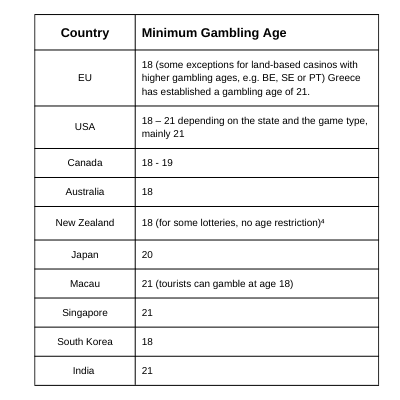Minimum Gambling Age and Why Regulators Believe it is Important

Minimum Gambling Age and Why Regulators Believe it is Important
France was one of the first to raise its minimum gambling age from 16 to 18 in 2007. Today, nearly all EU jurisdictions have set their legal gambling age to 18, whereas, in the US, the minimum age has always primarily been 21. One of the last in the row of European nations to change this was the UK, raising its minimum gambling age for Lottery from 16 to 18 in 2021. Recent changes have not stopped there. Georgia (Eastern Europe) passed a law last December which would set the gambling age at 25 as soon as it enters into force. This blog will consider what stands behind these relatively new discussions about the minimum gambling age.
Studies Show the Risks of Gambling Earlier in Life
Responsible gambling studies have highlighted that those most at risk of gambling-related harm are those up to age 25. Studies worldwide have concluded this, arguing that this is because of cognitive immaturities, less understanding of statistical probabilities, and young people and minors still do not have a fully developed executive function. Also, younger gamblers tend to be more influenced by family and friends.
At-Risk Gambling Rises Among Minors
Recent studies have shown that gambling harm among minors has increased, despite new laws prohibiting their play. In February 2022, a French study demonstrated that problem gambling among the age group 15 – 17 rose to 12.1% in 2021. The UK has also reportedly experienced a similar rise in problem gambling among minors. This has coincided with research that concludes gamblers of minor age seem to develop more problems with gambling later in life.
Prevalence Rates are Identical in Most Countries
Does raising the gambling age reduce problem gambling? We know that overall prevalence rates in countries with a gambling age of 21 are in the same range as where it is 18.
Studies are Key to Show the Impact of Higher Minimum Gambling Age Laws
Whether a higher gambling age, like that suggested in Georgia, will create lower levels of problematic gambling and underage gambling will only be known after trial and research by the regulator. However, from a common-sense perspective, it could help, as a 25-year old already has a higher level of cognitive perception.
Using gambling products at a later stage will not prevent problem gambling or gambling-related harm, but it seems likely that it will reduce it. Being informed, being cautious, and having self-monitoring behaviour remains as essential as ever.
Minimum Gambling Ages from Around the World³

- Unfortunately, due to different screens and age range applied, numbers cannot be adequately compared, which is one of the weaknesses of research by today.
- Pathological Gambling: A Critical Review. National Research Council (US) Committee on the Social and Economic Impact of Pathological Gambling. 1999 Link
- Note: This selection of gambling ages reflects the general approach to the topic, correct as of 04/04/22 Link
- YouthLaw Gambling New Zealand Link
Category
Other Blogs

March 31, 2022
Loyalty and Rewards Programmes for Players

March 14, 2022
Responsible Gaming Codes of Conduct – Are they worth the paper they are written on?

March 10, 2022
Responsible gaming tool: “Limit Setting” – its chances, challenges and shortfalls

March 03, 2022
Reporting using the UN Sustainable Development Goals

May 30, 2025
G4 Partners with SGcertified to Strengthen Auditing Services in Responsible Gambling

May 16, 2025
Nueva reglamentación publicitaria en España

January 20, 2025
The Importance of Accreditation with Lottopar

January 16, 2025
Insights on Anti-Money Laundering (AML) and the Didier Reynders case


